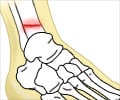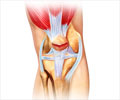The use of benzodiazepines and related drugs increases the risk of hip fracture by 43% in persons with Alzheimer's disease.

- Use of benzodiazepines increased the risk of hip fractures among people suffering from Alzheimer’s Disease.
- The rate of long-term hospital stay following hip fracture was also higher among Alzheimer’s patients who used benzodiazepines.
- Benzodiazepines and related drugs should be used in infrequent or short-term treatment of symptoms of dementia.
Benzodiazepines are a class of drugs mainly used to treat stress and anxiety. They act as a sedative to induce sleep and work as anti-anxiety drugs. They work by slowing down nerve transmission. This also means that they slow down the activity of the central nervous system and the messages traveling between the brain and body.
There is increasing concern among medical professionals about the risks associated with long-term use of these drugs.
In 2008, approximately 5.2% of US adults aged 18 to 80 years used benzodiazepines.
The percentage who used benzodiazepines increased with age from 2.6% (18-35 years) to 5.4% (36-50 years) to 7.4% (51-64 years) to 8.7% (65-80 years).
The proportion of benzodiazepine use that was long term increased with age from 14.7% (18-35 years) to 31.4% (65-80 years), while the proportion that received a benzodiazepine prescription from a psychiatrist decreased with age from 15.0% (18-35 years) to 5.7% (65-80 years).
Investigating Hip-Fracture
The hip fracture risk was investigated in community-dwelling Finnish persons with Alzheimer's disease.
The study was based on the MEDALZ (MEDication use and ALZheimer's disease) cohort, including all Finnish persons diagnosed with Alzheimer's disease between 2005 and 2011, amounting to 70,718 persons.
This study involved 46,373 persons who had no history of hip fractures and who had not used benzodiazepines and related drugs during the year preceding the study.
The follow-up time in the study was up to five years.
In total, 21% of persons with Alzheimer's disease initiated benzodiazepine and related drug use during the study.
During benzodiazepine and related drug use, 2.5 hip fractures occurred per 100 person-years whereas without drug use, the incidence was 1.4 hip fractures per 100 person-years.
The use of benzodiazepines and related drugs increased the hip fracture risk especially during the first six months of drug use.
There was no difference within the drug group, as benzodiazepines increased the hip fracture risk as much as benzodiazepine-related drugs.
Additionally, long-term hospital stays exceeding four months after hip fracture were more common in persons with Alzheimer's disease who used benzodiazepines and related drugs at the time of hip fracture than in persons who did not use such drugs.
Treatment guidelines in different countries recommend that behavioral and psychological symptoms of dementia should be treated with non-pharmacological options.
Benzodiazepines and related drugs can be used in infrequent or short-term treatment of symptoms.
The results of this study highlight the importance of the guidelines to avoid adverse events associated with benzodiazepine and related drug use.
References
- Benzodiazepine use in the United States - (https://www.ncbi.nlm.nih.gov/pubmed/25517224)
Source-Medindia












